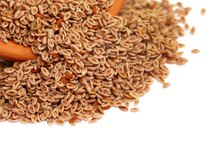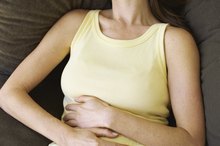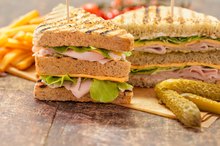Do Some Foods Aggravate Diverticulitis?
Diverticulitis occurs when small sacs called diverticula that protrude outward from the wall of the colon become inflamed. Common symptoms of diverticulitis include pain in the lower left abdominal area, fever, nausea, vomiting and constipation or diarrhea. The presence of diverticula without inflammation or symptoms is called diverticulosis. Diet recommendations for diverticulitis differ from those for diverticulosis. During an episode of diverticulitis, certain foods should be avoided that may aggravate the condition.
Foods to Avoid With Clear Liquid Diet
Although a high-fiber diet is recommended for people with diverticulosis, the opposite is true during an episode of diverticulitis when there is active inflammation of the bowel outpouchings. A clear liquid diet is often recommended during the initial days of treatment for diverticulitis. This diet includes only liquids that you can see through at room temperature. All foods other than clear liquids are to be avoided. In addition to not eating solid foods, liquid and semisolid foods to be avoided on a clear liquid diet include: -- Milk products. -- Creamy soups. -- Puddings and custards. -- Juices with pulp. -- Vegetable juices.
Foods to Avoid With Low-Fiber Diet
Metamucil & Diverticulitis
Learn More
If diverticulitis symptoms improve, the clear liquid diet transitions in a few days to a low-fiber diet. Limiting fiber rests the bowel and allows it to heal. Moderate- to high-fiber foods should be avoided on this diet, which is usually continued until inflammation has subsided. Foods to avoid while on a low-fiber diet that may aggravate diverticulitis include: -- Beans and raw or lightly cooked vegetables. -- Whole grains and whole-grain products. -- Nuts and seeds. -- Fresh fruits with skin.
Warnings and Precautions
Talk with your doctor or dietitian if you have questions about what foods are allowed on your diverticulitis diet. Seek care right away if you're going through an episode of diverticulitis and your symptoms fail to improve or worsen, or you develop new symptoms.
Related Articles
References
Writer Bio
Sarah Pflugradt holds a Master of Science in food science and human nutrition from Colorado State University. Pflugradt is a freelance writer and registered dietitian with experience in clinical nutrition and outpatient counseling for diabetes management and weight loss.









